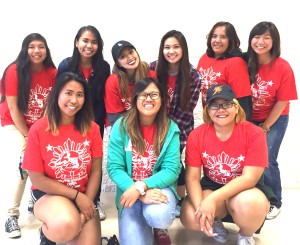FASA volunteers for the Philippine independence day celebration include, top row, right to left: Keri Quemuel, Ariel Nicole Boone, Monica Jose, Jazmin Clarito, Mildred Guillermo. Bottom row, board officers, left to right: Fundraiser Chair Joanna Guillermo; Community Chair Rhakel San Diego; Sergeant-at-Arms Charline Nacion. LAWRENCE OCHOA
LOS ANGELES — A significant number of second-generation Filipino Americans, mostly from colleges and universities that have cultural programs aimed bridging the two cultures, were drawn to the celebration of the 118th Philippine Independence Day Celebration in various communities here last weekend. The events elicited a lot of pride in their heritage among them.
“Philippine Independence Day, means freedom and the ability to express our cultural identity,” said Ariel Nicole Boone, a Cal State University Northridge (CSUN) senior and former Spring 2016 Filipino American Students Association (FASA) alumni chair.
Boone was one of the many millennial volunteers, part of a strong contingent from CSUN to a major Independence Day celebration June 9 held in Carson, a thriving harbor city 13 miles south of downtown Los Angeles. Filipino Americans make up 19 percent of its population.
“Most of us are Filipino American, and we’re trying to become more familiar with our ethnicity,” said Charline Nacion, current sergeant-at-arms with FASA. “It helps give our club exposure towards being in touch with our culture.
Cal State Northridge is one of the largest state academic institutions with about 41,000 students, 11 percent of whom are Asians, including Filipinos.
FASA is the oldest active Asian Pacific Islander API group on campus having been chartered in 1982. It provides activities that promote closer unity among Filipino Americans and involves them in the propagation and maintenance of Filipino cultural and historical heritage.
First time volunteers in the celebration this year, FASA members directed the traffic of performers on stage and managing the flow of parade activities. The group led, by its board and general members, monitored crowd order as they enjoyed performances ranging from the local Carson Coeds & Carson Street Dance Troupe to Cal State Long Beach’s Filipino American Coalition.
“It feels great to help out and give back to the Filipino community, especially since I have lived in the Philippines,” said Boone. “I understand what sacrifices were made by our ancestors in keeping our independence, and what difficulties were overcome to get to this point, since I’ve been on both sides of the coin.”
Moises “Jun” Aglipay, president and chairman of the event said, “it is with a lot of gratitude that we appreciate those bayanis (heroes) who fought and gave us this kalayaan (freedom) which means a whole lot to Filipino immigrants and that we pass on to the young generations.”
All the young people interviewed for this report agreed that Philippine Independence Day celebrations made a profound impact on them, bringing out pride and self-esteem as products of two cultures.
Keri Quemuel, a second-year CSUN junior who was the former FASA historian said she had previously worked with a Filipino cultural school where “we learned to dance the tinikling. ” She recalled this experience after seeing “traditional and modern dances being performed out on the stage during the festival.”
A young resident of Northridge, Paolo O. who graduated this month with a degree in communication from Sonoma State University said, “When I was eight or nine I would always ask my mom to bring me back from her trip from the Philippines some ‘whitening soap.’ I never liked how brown I was. Looking back at that time, I felt ashamed of the color of my skin. At such a young age growing up fed by American media I thought ‘White is right.’”
During his first year in college, he encountered the Filipino American Student Organization (FASO), and that opened his mind about his roots and heritage. Serving as its president last year, Paolo laments that many of his millennial generation do not even speak Tagalog or any of the Philippines’ dialects.
“It’s so nice seeing people come out, especially the ones in the authentic cultural dresses, like the barong for guys. I like seeing them among the crowd of people,” said Rhakel San Diego, 19, current community chair for CSUN FASA. The organization presented last spring a cultural show entitled “Tsinelas,” set in the 1990s slums of Metro manila, to sensitize its membership about class struggles in the Philippines.
Lauding the event, Paolo said, “We should be able to uphold the roots of our culture and be confident that we can still prosper as Filipino Americans in this adopted country.” Now a college graduate, the millennial added, “Colonization has influenced us immensely, but it doesn’t mean we can’t influence others to be proud of and stand strong for our culture.”
